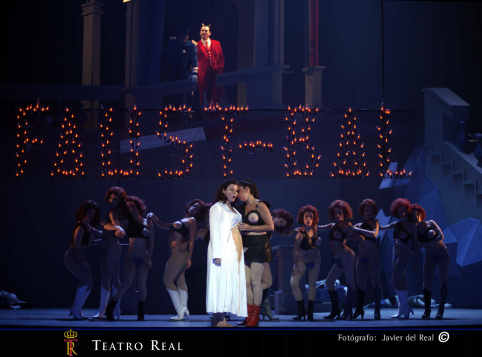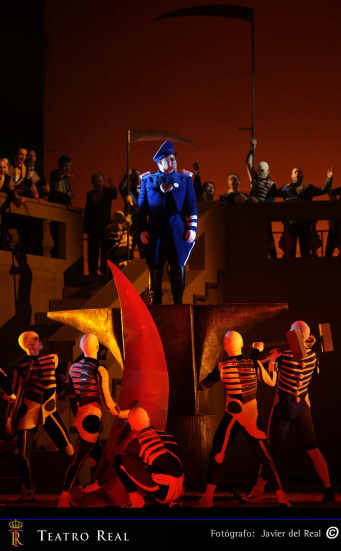Other Links
Editorial Board
-
Editor - Bill Kenny
-
Deputy Editor - Bob Briggs
Founder - Len Mullenger
Google Site Search
SEEN
AND HEARD INTERNATIONAL OPERA REVIEW
Leonardo Balada, Faust-bal:
(World Premiere)
Soloists, Orquesta Sinfónica de Madrid. Coro
del Teatro Real.Conductor: Jesús López Cobos.Teatro
Real de Madrid. 16 & 20.2.2009 (JMI)
Joan Font’s production (Les Comediants) was also
quite bright and pleasant to look at. The sets
consist of two big staircases that meet at the
centre, and the whole thing is crowned by a kind of
vault from which God watches and enjoys the scene.
The final confrontation between Faust and Margarito
takes place on mobile elements, reminding me very
much of what La Fura dels baus used in their last
Ring in Valencia. Remarkable lighting and good use of
extras and dancers completed a vivid production.
Direction. Joan Font (Les Comediants)
Sets and Costumes: Joan Guillén
Lighting: Albert Faura
Choreography: Xevi Dorca
Cast:
Faust-bal: Ana Ibarra/María Rodríguez.
Margarito: Gerhard Siegel/Eduardo Santamaría.
Mefistófeles: Tomas Tomasson/Lauri Vasar.
Amazona: Cecilia Díaz.
God: Stefano Palatchi
Judge: Fernando Latorre

Leonardo Balada has a long relationship with writer
Fernando Arrabal, who is a surrealist or, perhaps
more accurately, an absurdist like Alfred Jarry whose
Exploits and Opinions of Dr Faustroll, Pataphysician
is probably an antecedent to this work.
They have worked together before on projects related
to the Spanish Civil war, but none of these came to
fruition.
According to the notes in the programme it seems
clear that the project was driven by Arrabal’s text.
However, despite this, Balada seems to have decided
to create his music without too much consideration
for the libretto.
To start at the beginning, everybody understands the
name Faust in the title of the opera, but probably
very few will understand the meaning of “Faust-bal”.
In fact it is a way for Arrabal to create his own
Faust by adding the syllable “bal”, which is formed
by the three first letters of Balada and three last
letters of Arrabal. This is one of the only things to
be readily explained, as the libretto becomes
difficult from this point. The plot of Faust-bal is
based on the classical character Faust, but takes
place in the third millennium in which the two
principal characters' genders are switched. Faust is
now Faust-bal, a beautiful woman of superior
intellect and the only visible example of human
goodness in a world dominated by violence. The opera
is full of symbolism and contrasts, ranging from pure
idealism to destruction by war, from the ironic to
the grotesque, culminating in a tragic conclusion.
Faust-bal is meant to be universal in its music
and story without any particular ethnic associations.
Leonardo Balada has always seemed to me a composer
who is way above his Spanish colleagues whose operas
have been premiered at Teatro Real. His music is
quite easy to understand and is readily accepted by
most people. There is no question that we are talking
about contemporary music, but I would like to
emphasize two important aspects of this: first of all
he does not write music in which the singers are his
enemies, as so often happens with modern operas, and
secondly his handling of choral music is probably the
best part of the score. Despite the supposed
universality of the plot, I suspect that Balada’s
biggest mistake in this instance may have been his
choice of librettist because even if the opera were a
huge success, it would be difficult to perform it
outside of Spain because translating Arrabal’s
verses would be a complicated business: even in
Spanish these verses rarely make much sense.
As mentioned above Faust-bal is a girl, who
personifies goodness, while Margarito (the Spanish
male equivalent of Marguerite) stands for the
violence, war and evil that overwhelms the 3rd
millennium world. Mefistófeles moves the action,
while God observes from on high watching what happens
as he eats and drinks. Faust-bal has an affair with
Amazona, giving birth on
stage to a child through cloning, and is sentenced to
prison. She is later freed by God who apparently
eventually decides to get invloved. At the end,
Margarito rapes Faust-bal, who then dies and an
army of
Amazons kills Margarito.
Jesús López Cobos did a very good job conducting the
opera and it was not an easy task.His orchestra was
very disciplined in performing a score that was very
difficult for them. The chorus was also very good:
there are many pages for them that are very
demanding and they responded well to the challenge.

The opera lasted 90 minutes without intermission.
When the curtain came down there was tepid applause
and sonorous shouts of “This is a shame”. When López
Cobos took his bow, after the singers, no more than
half of the audience remained in the stalls. The
reaction the following day was much better. There was
warm applause then, no shouting, and people remained
in their seats until the curtain came down.
José M Irurzun
Pictures © Javier del Real
Back
to Top
Cumulative Index Page
